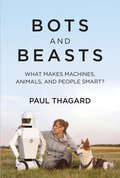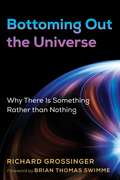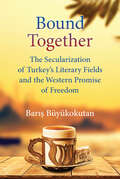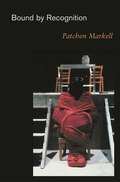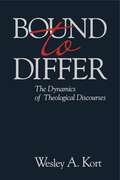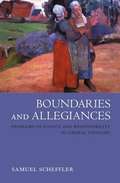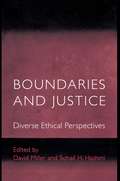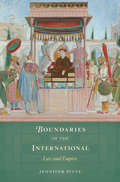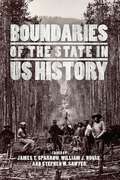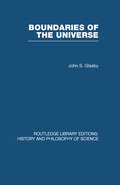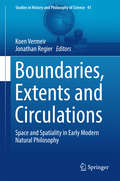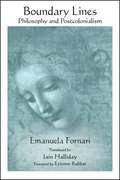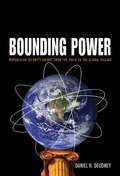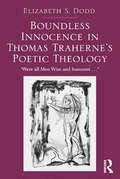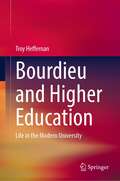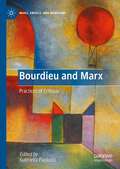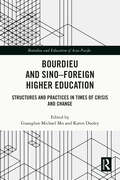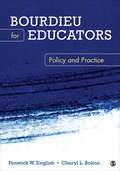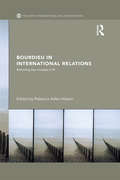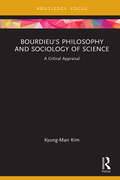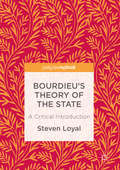- Table View
- List View
Boswell's Enlightenment
by Robert ZaretskyThroughout his life James Boswell struggled to fashion a clear account of himself, but try as he might he could not reconcile the truths of his era with those of his religious upbringing. Few periods better crystallize this turmoil than 1763-1765, the years of his Grand Tour and the focus of Robert Zaretsky's thrilling intellectual adventure.
Bots and Beasts: What Makes Machines, Animals, and People Smart?
by Paul ThagardAn expert on mind considers how animals and smart machines measure up to human intelligence.Octopuses can open jars to get food, and chimpanzees can plan for the future. An IBM computer named Watson won on Jeopardy! and Alexa knows our favorite songs. But do animals and smart machines really have intelligence comparable to that of humans? In Bots and Beasts, Paul Thagard looks at how computers ("bots") and animals measure up to the minds of people, offering the first systematic comparison of intelligence across machines, animals, and humans. Thagard explains that human intelligence is more than IQ and encompasses such features as problem solving, decision making, and creativity. He uses a checklist of twenty characteristics of human intelligence to evaluate the smartest machines--including Watson, AlphaZero, virtual assistants, and self-driving cars--and the most intelligent animals--including octopuses, dogs, dolphins, bees, and chimpanzees. Neither a romantic enthusiast for nonhuman intelligence nor a skeptical killjoy, Thagard offers a clear assessment. He discusses hotly debated issues about animal intelligence concerning bacterial consciousness, fish pain, and dog jealousy. He evaluates the plausibility of achieving human-level artificial intelligence and considers ethical and policy issues. A full appreciation of human minds reveals that current bots and beasts fall far short of human capabilities.
Bottoming Out the Universe: Why There Is Something Rather than Nothing
by Richard GrossingerAn exploration into consciousness, the universe, and the nature of reality • Draws on transdimensional physics and biology, reincarnation and past-life memories, animal consciousness, multiple identities, thoughtforms, soul pictures, and paranormal phenomena like crop circles and poltergeists • Explores the riddle of personal identity and how it differs from consciousness • Reveals that consciousness is more than encompassing all that exists--it also speaks to what has yet to manifest Scientific orthodoxy views the universe as conceived of matter--protons, neutrons, electrons, down to the smallest particle, quarks. But, when you keep digging, what is &“beneath&” quarks? The scientific worldview does not take into account consciousness or life itself. How did consciousness become part of the material universe? Is it a by-product of brain chemistry or a constituent of reality? Or, to dig deeper, which is more fundamental: the existence of an objective physical universe or our subjective experience of it? In this investigation into consciousness, the universe, and the nature of reality, Richard Grossinger offers a wide-ranging foundation for reimagining the universe as based in consciousness rather than matter. He presents in-depth analysis of the standard scientific description of the universe, revealing the holes in its theories. Exploring the interpenetration of matter and all reality by consciousness, the author looks at reincarnation and past-life memories, examining famous and lesser-known but verifiable accounts. He then explores the nature and origin of consciousness, with accompanying explorations of animal consciousness, the brain as a computer, multiple identities, thoughtforms, soul pictures, and paranormal phenomena like UFOs, faeries, and poltergeists. He also examines concepts from physics that combine elements of both consciousness and matter, such as collapsing waveforms and the uncertainty principle of quantum mechanics. Examining nonlocal and transpersonal modes of consciousness, Grossinger looks at the difference between consciousness and personal identity. He expands this discussion with reflections on Sethian cosmology, using Seth&’s own words and Jane Roberts&’s and John Friedlander&’s interpretations. He reveals that consciousness also encompasses what has yet to manifest and explains why the universe exists at all: why there is &“something&” rather than &“nothing.&” Skewering the materialist paradigm and placing consciousness alongside mass, gravity, and heat as an essential component of the universe, Grossinger proposes that reality is a thoughtform where sentient beings collaborate to bring about a concrete realm vibrating at their own frequency.
Bound By Honor
by Gary Smalley Greg SmalleyGary and Greg Smalley are psychologists as well as father and son. They share insights from their relationship as well as their experience with their clients. They teach parents how to create a loving, respectful, and nurturing relationship with teenagers. Topics include offering loving discipline, handling the family car, dating, and letting go as teens reach adulthood.
Bound Together: The Secularization of Turkey’s Literary Fields and the Western Promise of Freedom
by Baris BüyükokutanBound Together takes a new look at twentieth-century Turkey, asking what it will take for Turkish women and men to regain their lost freedoms, and what the Turkish case means for the prospects of freedom and democracy elsewhere. Contrasting the country’s field of poetry, where secularization was the joint work of pious and nonpious people, with that of the novel, this book inquires into the nature of western-nonwestern difference. Turkey’s poets were more fortunate than its novelists for two reasons. Poets were slightly better at developing the idea of the autonomy of art from politics. While piety was a marker of political identity everywhere, poets were better able than novelists to bracket political differences when assessing their peers as the country was bitterly polarized politically and as the century wore on. Second, and more important, poets of all stripes were more connected to each other than were novelists. Their greater ability to find and keep one another in coffeehouses and literary journals made it less likely for prospective cross-aisle partnerships to remain untested propositions.
Bound by Recognition
by Patchen MarkellIn an era of heightened concern about injustice in relations of identity and difference, political theorists often prescribe equal recognition as a remedy for the ills of subordination. Drawing on the philosophy of Hegel, they envision a system of reciprocal knowledge and esteem, in which the affirming glance of others lets everyone be who they really are. This book challenges the equation of recognition with justice. Patchen Markell mines neglected strands of the concept's genealogy and reconstructs an unorthodox interpretation of Hegel, who, in the unexpected company of Sophocles, Aristotle, Arendt, and others, reveals why recognition's promised satisfactions are bound to disappoint, and even to stifle. Written with exceptional clarity, the book develops an alternative account of the nature and sources of identity-based injustice in which the pursuit of recognition is part of the problem rather than the solution. And it articulates an alternative conception of justice rooted not in the recognition of identity of the other but in the acknowledgment of our own finitude in the face of a future thick with surprise. Moving deftly among contemporary political philosophers (including Taylor and Kymlicka), the close interpretation of ancient and modern texts (Hegel's Phenomenology, Aristotle's Poetics, and more), and the exploration of rich case studies drawn from literature (Antigone), history (Jewish emancipation in nineteenth-century Prussia), and modern politics (official multiculturalism), Bound by Recognition is at once a sustained treatment of the problem of recognition and a sequence of virtuoso studies.
Bound to Differ: The Dynamics of Theological Discourses (G - Reference, Information and Interdisciplinary Subjects)
by Wesley A. KortIn this analysis of theological conflict, Wesley Kort treats theologies as discourses that generate power and significance by their relations to and differences from one another. He identifies the traditional or putative claims of theological power and meaning—sources, referents, and patterns or structures—as distractions from or even concealments of the discursive situation in which theologies arise.Kort first describes the dynamics of difference and conflicts constituted by theologies and the importance of power for opposing theologies. He provides a model that demonstrates why differences and conflicts, rather than occasional or peripheral effects of theology, are required as central causes. He then applies the analysis and model in the task of reading theologies of more than a dozen modern and contemporary figures.In his conclusion, Kort returns to the cultural situation he sketched at the beginning, one that creates the conditions for the study and that is often called "postmodern." Kort calls it "a culture of scripture and belief," and he discusses prospects for theology in a culture not characterized by the fact and certainty. "The culture of scripture and belief" calls for theologies that are both forceful and vulnerable to critique.
Boundaries and Allegiances: Problems of Justice and Responsibility in Liberal Thought
by Samuel SchefflerThis book is a collection of eleven essays by one of the most interesting moral philosophers. It examines challenges to liberal thought posed by the changing circumstances of the modern world such as the conflicting tendencies toward global integration, and greater ethnic and communal identification. The author considers whether liberal principles of justice can accommodate social and global interdependencies while reaffirming the importance of individual responsibility and acknowledging the significance of people's diverse personal and communal allegiances.
Boundaries and Justice: Diverse Ethical Perspectives (Ethikon Series in Comparative Ethics #4)
by David Miller & Sohail H. HashmiDespite the supreme political and economic significance of boundaries--and ongoing challenges to existing national boundaries--scant attention has been paid to their ethics. This volume explores how diverse ethical traditions understand the political and property rights reflected in territorial and jurisdictional boundaries. It is the first book to bring together thinkers from a range of traditions, both religious and secular, to discuss the ethics of boundaries. Each contributor represents a tradition's views on questions surrounding the use of boundaries to delimit property and political rights. What does it mean to own something? What resources should not be privately owned? What justifies the erection of political boundaries between one people and another? How ''hard'' should such boundaries be? What rights extend to minorities within a state? Should territorial boundaries coincide with social ones? Does national autonomy have an ethical basis, or is it an aspect of modern power politics? Should we aim for a more inclusive community than that afforded by modern nation-states? Cross-chapter dialogue and a substantive conclusion draw out similarities and differences among the traditions represented, traditions that include Christianity, classical liberalism, Confucianism, international law, Islam, Judaism, liberal egalitarianism, and natural law. In addition to the editors, the contributors are Nigel Biggar, Joseph Boyle, Joseph Chan, Russell Hardin, Will Kymlicka, Loren Lomasky, Robert McCorquodale, Richard B. Miller, David Novak, Sulayman Nyang, Michael Nylan, Raul C. Pangalangan, Daniel Philpott, Jeremy Rabkin, Hillel Steiner, M. Raquibuz Zaman, and Noam J. Zohar.
Boundaries of the International: Law and Empire
by Jennifer PittsIt is commonly believed that international law originated in relations among European states that respected one another as free and equal. In fact, as Jennifer Pitts shows, international law was forged at least as much through Europeans’ domineering relations with non-European states and empires, leaving a legacy still visible in the unequal structures of today’s international order. Pitts focuses on the eighteenth and nineteenth centuries, the great age of imperial expansion, as European intellectuals and administrators worked to establish and justify laws to govern emerging relationships with non-Europeans. Relying on military and commercial dominance, European powers dictated their own terms on the basis of their own norms and interests. Despite claims that the law of nations was a universal system rooted in the values of equality and reciprocity, the laws that came to govern the world were parochial and deeply entangled in imperialism. Legal authorities, including Emer de Vattel, John Westlake, and Henry Wheaton, were key figures in these developments. But ordinary diplomats, colonial administrators, and journalists played their part too, as did some of the greatest political thinkers of the time, among them Montesquieu and John Stuart Mill. Against this growing consensus, however, dissident voices as prominent as Edmund Burke insisted that European states had extensive legal obligations abroad that ought not to be ignored. These critics, Pitts shows, provide valuable resources for scrutiny of the political, economic, and legal inequalities that continue to afflict global affairs.
Boundaries of the State in US History
by William J. Novak James T. Sparrow Stephen W. SawyerThe question of how the American state defines its power has become central to a range of historical topics, from the founding of the Republic and the role of the educational system to the functions of agencies and America's place in the world. Yet conventional histories of the state have not reckoned adequately with the roots of an ever-expanding governmental power, assuming instead that the American state was historically and exceptionally weak relative to its European peers. Here, James T. Sparrow, William J. Novak, and Stephen W. Sawyer assemble definitional essays that search for explanations to account for the extraordinary growth of US power without resorting to exceptionalist narratives. Turning away from abstract, metaphysical questions about what the state is, or schematic models of how it must work, these essays focus instead on the more pragmatic, historical question of what it does. By historicizing the construction of the boundaries dividing America and the world, civil society and the state, they are able to explain the dynamism and flexibility of a government whose powers appear so natural as to be given, invisible, inevitable, and exceptional.
Boundaries of the Universe (Routledge Library Editions: History & Philosophy of Science)
by John S GlasbyThe boundaries of space exploration are being pushed back constantly, but the realm of the partially understood and the totally unknown is as great as ever. Among other things this book deals with astronomical instruments and their application, recent discoveries in the solar system, stellar evolution, the exploding starts, the galaxies, quasars, pulsars, the possibilities of extraterrestrial life and relativity.
Boundaries, Extents and Circulations: Space and Spatiality in Early Modern Natural Philosophy (Studies in History and Philosophy of Science #41)
by Koen Vermeir Jonathan RegierThis volume is an important re-evaluation of space and spatiality in the late Renaissance and early modern period. History of science has generally reduced sixteenth and seventeenth century space to a few canonical forms. This volume gives a much needed antidote. The contributing chapters examine the period's staggering richness of spatiality: the geometrical, geographical, perceptual and elemental conceptualizations of space that abounded. The goal is to begin to reconstruct the amalgam of "spaces" which co-existed and cross-fertilized in the period's many disciplines and visions of nature. Our volume will be a valuable resource for historians of science, philosophy and art, and for cultural and literary theorists.
Boundary Control
by Edward L. GibsonThe democratization of a national government is only a first step in diffusing democracy throughout a country's territory. Even after a national government is democratized, subnational authoritarian 'enclaves' often continue to deny rights to citizens of local jurisdictions. Gibson offers new theoretical perspectives for the study of democratization in his exploration of this phenomenon. His theory of 'boundary control' captures the conflict pattern between incumbents and oppositions when a national democratic government exists alongside authoritarian provinces (or 'states'). He also reveals how federalism and the territorial organization of countries shape how subnational authoritarian regimes are built and how they unravel. Through a novel comparison of the late nineteenth-century American 'Solid South' with contemporary experiences in Argentina and Mexico, Gibson reveals that the mechanisms of boundary control are reproduced across countries and historical periods. As long as subnational authoritarian governments coexist with national democratic governments, boundary control will be at play.
Boundary Lines: Philosophy and Postcolonialism (SUNY series in Contemporary Italian Philosophy)
by Emanuela FornariIn this book, Emanuela Fornari systematically examines the philosophical implications of postcolonial studies. She considers postcolonial critique not as a school or a current of thought but rather as a multiform constellation that—from the celebrated Orientalism of Edward Said to the contributions of authors like Homi Bhabha, Gayatri Spivak, Ranajit Guha, and Dipesh Chakrabarty—has called into question the assumptions that underlie key concepts in the history of philosophy. Fornari addresses themes such as history and memory, borders, the subject, and translation, engaging classical authors such as Kant, Hegel, and Marx alongside more contemporary theorizations by authors such as Walter Benjamin, Michel Foucault, Jacques Derrida, Étienne Balibar, and Jacques Rancière.
Bounding Power: Republican Security Theory from the Polis to the Global Village
by Daniel H. DeudneyRealism, the dominant theory of international relations, particularly regarding security, seems compelling in part because of its claim to embody so much of Western political thought from the ancient Greeks to the present. Its main challenger, liberalism, looks to Kant and nineteenth-century economists. Despite their many insights, neither realism nor liberalism gives us adequate tools to grapple with security globalization, the liberal ascent, and the American role in their development. In reality, both realism and liberalism and their main insights were largely invented by republicans writing about republics. The main ideas of realism and liberalism are but fragments of republican security theory, whose primary claim is that security entails the simultaneous avoidance of the extremes of anarchy and hierarchy, and that the size of the space within which this is necessary has expanded due to technological change. In Daniel Deudney's reading, there is one main security tradition and its fragmentary descendants. This theory began in classical antiquity, and its pivotal early modern and Enlightenment culmination was the founding of the United States. Moving into the industrial and nuclear eras, this line of thinking becomes the basis for the claim that mutually restraining world government is now necessary for security and that political liberty cannot survive without new types of global unions. Unique in scope, depth, and timeliness, Bounding Power offers an international political theory for our fractious and perilous global village.
Boundless Innocence in Thomas Traherne's Poetic Theology: 'Were all Men Wise and Innocent...'
by Elizabeth S. DoddThe seventeenth-century poet and divine Thomas Traherne finds innocence in every stage of existence. He finds it in the chaos at the origins of creation as well as in the blessed order of Eden. He finds it in the activities of grace and the hope of glory, but also in the trials of misery and even in the abyss of the Fall. Boundless Innocence in Thomas Traherne’s Poetic Theology traces innocence through Traherne’s works as it transgresses the boundaries of the estates of the soul. Using grammatical and literary categories it explores various aspects of his poetic theology of innocence, uncovering the boundless desire which is embodied in the yearning cry: ’Were all Men Wise and Innocent...’ Recovering and reinterpreting a key but increasingly neglected theme in Traherne’s poetic theology, this book addresses fundamental misconceptions of the meaning of innocence in his work. Through a contextual and theological approach, it indicates the unexplored richness, complexity and diversity of this theme in the history of literature and theology.
Bourdieu and Higher Education: Life in the Modern University
by Troy HeffernanThis book introduces Bourdieu in the context of higher education for unfamiliar readers or those who would like to see his theories applied in the higher education setting. It builds upon research into higher education leadership and administration to examine how the university sector has changed over recent decades and how it has been reshaped into its current form.The book draws together various aspects of higher education influenced by the mass-market higher education system to examine how these forces have affected each other positively and negatively and demonstrate the culminating impact of these forces on the sector. It also focuses on the realities of what drives work and life in the modern university. It traces the steps the sector has taken in some areas to address equity issues by increasing diversity and inclusion and highlights the systemic issues that persist.
Bourdieu and Marx: Practices of Critique (Marx, Engels, and Marxisms)
by Gabriella PaolucciThis new book gathers together essays concerning the strategic modes of appropriation that Bourdieu practiced with regard to Marx, together with their various outcomes. It is especially devoted to the practice of critique that both thinkers exercised vigilantly throughout their careers, as this is the terrain on which we can best illuminate the debt that Bourdieu acknowledged to Marx. Ongoing dialogue with the entire body of Marxian critique is a constant in Bourdieu's writings. This is most clearly evidenced by the adoption of a critical perspective on the social world that denotes a massive Marxian presence. It is reinforced by the repeated references to Marx’s texts that the sociologist scatters throughout his works. Indeed, in the interlinked set of critiques underpinning the architecture of his work, in the plethora of questions he raises, and in the scientific practice he adopts, Bourdieu attaches himself to the Marxian model — notwithstanding his polemical remarks and his own deviations, or, we might even say, by virtue of them. The book is divided into three interconnected sections for ease of access: critique of domination, critique of economic practices and theories, and critique of ideology. As the first volume in English to explore the relationship between Bourdieu and Marx, this book is vital reading for students and scholars of social and anthropological theory.
Bourdieu and Sino–Foreign Higher Education: Structures and Practices in Times of Crisis and Change (Bourdieu and Education of Asia Pacific)
by Guanglun Michael Mu Karen DooleyBourdieu’s sociology has traditionally been confined to the limits of its French national context. This edited collection seeks to challenge these boundaries, applying Bourdieu’s analysis of practice to Chinese education as it gains relevance and attention around the globe. This book stems from the conviction that empirical investigation and conceptual inventiveness are needed to understand the historical and contextual particularities of Sino-foreign higher education. It brings the sociology of Pierre Bourdieu to the specificity of higher education in and for China and the multi-scalar complexity of higher education beyond the nation. Aggregating recent Bourdieu-informed investigations of empirical worlds of Sino-foreign higher education, the volume mainly considers two problems: structures and strategies of advantage behind institutional and individual action in Sino-foreign higher education; and student participation in the practices of that higher education. The volume probes the potential of Bourdieusian theory and methodology for understanding Chinese higher education beyond the nation. This book is written to engage with the intellectual work of both established scholars and higher degree research students within China and beyond. The empirical studies provide useful insights for educational leaders in Chinese higher education sectors and in the universities of English-dominant western countries where students and researchers from China have been a growing presence. The theoretical and methodological discussions will be pertinent to scholars who are interested in Bourdieu’s sociology and sociology of higher education.
Bourdieu for Educators: Policy and Practice
by Fenwick W. English Cheryl L. BoltonEducational change and reform on a larger scale Bourdieu for Educators: Policy and Practice brings the revolutionary research and thinking of Pierre Bourdieu (1930-2002) of France to public educational leaders in North America, Canada, Australia, and the U.K. This text brings Bourdieu’s work into the arena of elementary and secondary educational reform and change, and offers policy, research, and practice discussions. Authors Fenwick W. English and Cheryl L. Bolton use Bourdieu to challenge the standards movement in different countries, the current vision of effective management, and the open-market notion connecting pay to performance. The text shows that connecting pay to performance won’t improve education for the poorest group of school students in the U.S., Canada, or the U.K., regardless of how much money is spent trying to erase the achievement gap. The authors lay out the bold educational agenda of Pierre Bourdieu by demonstrating that educational preparation must take into account larger socioeconomic-political realities in order for educational change and reform to make an impact.
Bourdieu for Educators: Policy and Practice
by Fenwick W. English Cheryl L. BoltonEducational change and reform on a larger scale Bourdieu for Educators: Policy and Practice brings the revolutionary research and thinking of Pierre Bourdieu (1930-2002) of France to public educational leaders in North America, Canada, Australia, and the U.K. This text brings Bourdieu’s work into the arena of elementary and secondary educational reform and change, and offers policy, research, and practice discussions. Authors Fenwick W. English and Cheryl L. Bolton use Bourdieu to challenge the standards movement in different countries, the current vision of effective management, and the open-market notion connecting pay to performance. The text shows that connecting pay to performance won’t improve education for the poorest group of school students in the U.S., Canada, or the U.K., regardless of how much money is spent trying to erase the achievement gap. The authors lay out the bold educational agenda of Pierre Bourdieu by demonstrating that educational preparation must take into account larger socioeconomic-political realities in order for educational change and reform to make an impact.
Bourdieu in International Relations: Rethinking Key Concepts in IR (New International Relations)
by Rebecca Adler-NissenThis book rethinks the key concepts of International Relations by drawing on the work of Pierre Bourdieu. The last few years have seen a genuine wave of publications promoting sociology in international relations. Scholars have suggested that Bourdieu’s vocabulary can be applied to study security, diplomacy, migration and global environmental politics. Yet we still lack a systematic and accessible analysis of what Bourdieu-inspired IR might look like. This book provides the answer. It offers an introduction to Bourdieu’s thinking to a wider IR audience, challenges key assumptions, which currently structure IR scholarship – and provides an original, theoretical restatement of some of the core concepts in the field. The book brings together a select group of leading IR scholars who draw on both theoretical and empirical insights from Bourdieu. Each chapter covers one central concept in IR: Methodology, Knowledge, Power, Strategy, Security, Culture, Gender, Norms, Sovereignty and Integration. The chapters demonstrate how these concepts can be reinterpreted and used in new ways when exposed to Bourdieusian logic. Challenging key pillars of IR scholarship, Bourdieu in International Relations will be of interest to critical theorists, and scholars of IR theory.
Bourdieu's Philosophy and Sociology of Science: A Critical Appraisal (Routledge Studies in Social and Political Thought)
by Kyung-Man KimThis book explores Pierre Bourdieu's philosophy and sociology of science, which, though central to his thought, have been largely neglected in critical examinations of his work. Addressing the resultant confusion that surrounds Bourdieu's sociologized philosophy of science, it expounds his epistemology and sociology of science, situating it within the context of Anglo-American post-positivist philosophy of science and shedding light on the critique of relativist sociology of science that emerges from his field theory. From a detailed critique of Bourdieu's reflexive sociology and his attempt to enhance the uneasy epistemic status of the social sciences, the author draws on the thought of Jürgen Habermas to suggest critical ethnography as a way of going beyond Bourdieu’s critical theory. As such, Bourdieu's Philosophy and Sociology of Science will appeal to sociologists, philosophers, and scholars across the social sciences with interests in the work of Bourdieu and the sociology and philosophy of science.
Bourdieu's Theory of the State: A Critical Introduction
by Steven LoyalThis book critically examines Pierre Bourdieu's theory of the state by assessing its theoretical and empirical value. Steven Loyal expertly situates Bourdieu's work within the context of both classical and modern theories of the state, providing a comprehensive frame of reference. Finally, Loyal discusses Bourdieu's theoretical limitations and projects how his theory of the state might be utilized in the future.

